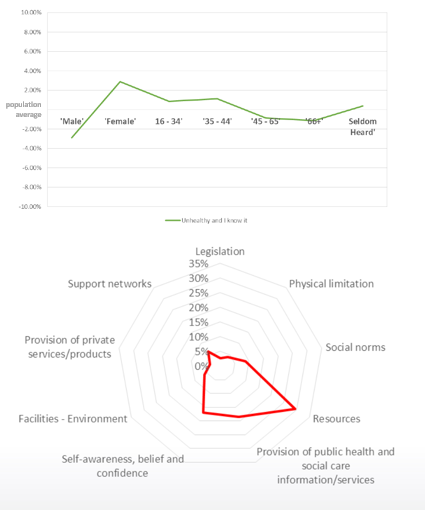34% of our people are “unhealthy and they know it”.
There are slightly younger women (under 45’s) in this population, with just as many “seldom heard” people as the average.

When discussing what hinders or helps people to take charge of their health? Their conversation reveals four priorities:
- Personal resources – time and money
- Provision of public health and social care information and services
- Self-awareness, belief and confidence
- Social norms in the circles they mix
We can create a “typical narrative” from their ideas, comments and votes in the online workshop too.
I know I am unhealthy and I want to improve my health, but I find it difficult because…
Resources
I don’t have enough time, money or energy to live a healthy life. I have tried to find information on inexpensive, easy and quick ways of being active and eating healthily, and I haven’t found anything useful.
“After working full time and being a single parent I’m far too tired when I get home!”
“I really want to eat and offer healthy food , I am time, motivation, knowledge and cash poor.”
“I am in my mid forties. Going to the gym is expensive and requires time I don’t have.”
Provision of public health and social care information/services
It is challenging to access health support and services, waiting times are too long and doctors’ interventions are not effective and holistic.
“When I had a serious depression, though I was very ill psychotherapy options were limited and to receive the treatment I needed I had to wait 12 months then travel to Manchester every week for the 6month treatment.”
“Currently [mental health support] resources are limited and it took 6 weeks to get support and then after x amount of sessions, even if you are still suffering you get discharged.”
Self-awareness, belief and confidence
I have developed unhealthy habits that are difficult to change because they have been ingrained in me since my childhood. I can’t find a way to stop smoking or drink less. I have tried too many times and failed. Now I simply lack the confidence and/or motivation to take any action.
“Some of us have smoked a lot and for a long time. It’s very hard to stop.”
“I think a lot of people who need to get healthier need their confidence boosting first…for me it’s the confidence. I think we should ask why aren’t people going outdoors…why don’t they mix… why.”
“I think people are only really concerned with their health, when something goes wrong with their health or the health of their loved ones.”
“Most of the issues with food & healthy eating stem from childhood, from healthy eating, learning how to prepare foods, fussy eating & a preference for healthier foods.”
Social norms
In this country we have a culture of binge drinking. When I go out with my friends and everyone is drinking and/or smoking, I find it hard to be the only one who doesn’t.
“Both of my children smoke (aged 19 and 22) and both tell me that they were influenced to start smoking by their peers when in their mid-teens.”
“I moved to the UK about 10 years ago from France. I feel like here binge drinking is considered a strength. You are cool if you can binge drink and other people look down on you for not drinking, or for not “keeping up” and drinking a lot.”
Interestingly, solutions offered by this population include:
> Introduce local cooking classes to teach how to cook affordable, easy to cook meals
> Provide health and lifestyle review and goal setting service at GP surgeries and work with patients to create a programme that is designed for the patient to support them achieve their health and wellbeing goals
> Introduce local cycling and walking groups
> Introduce healthy cooking/eating programs in schools